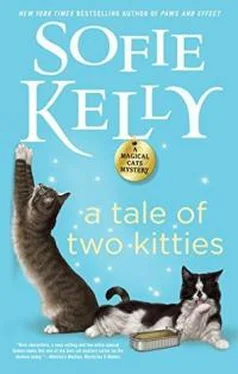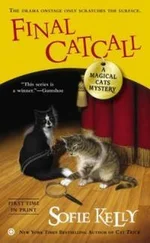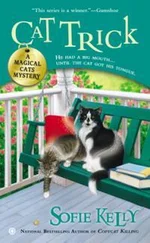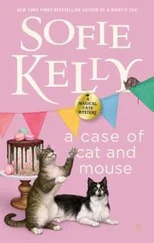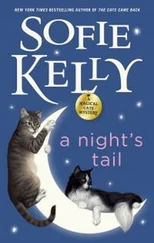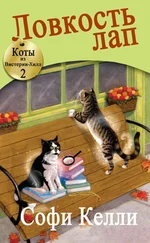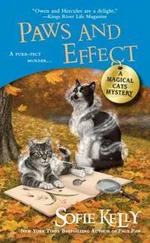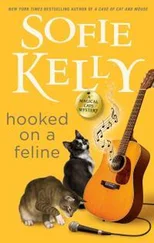She smiled. “Thank you. It’s not expensive but it was a gift, so it has a lot of sentimental value for me.” Her hazel eyes narrowed. “You were at Leo Janes’s funeral,” she said.
I nodded. “Yes, I was.”
“Leo’s wife, Meredith, was my best friend.”
Meredith Janes. Her name seemed to keep coming up.
“So you grew up in Mayville Heights?” I took a step to the right to get out of the way of a woman pushing a chubby-cheeked baby in an umbrella stroller.
Celia’s smile returned. “Yes. I haven’t been back in years. So much has changed and yet so much is the same. I heard that the library has been restored.”
“For the building’s centennial, yes,” I said. “You can see it when you come to get your scarf.”
“I’ll try to get there tomorrow,” she said. “I’m staying at the St. James so I’m close by. I plan on being here another week.” She hesitated, brushing a bit of lint off the sleeve of her caramel-colored jacket. “I actually came to see Leo. Did you hear about the mail that was found behind the wall at the post office?”
I nodded.
“One of those pieces of mail was addressed to me. It was sent by Meredith the day she died. I came here to show it to Leo.”
I looked around, hoping I could spot Marcus. This had to mean something.
Something flashed across her face for a moment, like a cloud passing over the sun. “Kathleen, excuse me if I’m being, well, too presumptuous, but you’re friends with Leo’s son, Simon, aren’t you? I mean, I saw you sitting with him and his daughter at the service.”
I was picking at the cuff of my sweater, I realized. I put my hand in my pocket. “Yes, I am.”
“Then maybe you can give me some guidance.” She pressed her lips together for a moment. “Once I got here I had second thoughts about showing Leo the letter Meredith had sent me all those years ago. I, uh, I was afraid it might be painful for Leo so the first time I visited him I didn’t mention it. I just said I was here and wanted to say hello.”
I wasn’t sure what to say, so I just nodded. “The second time I went to see him I had the letter with me but Leo obviously had something on his mind. He was distracted. He looked at his watch a couple of times and then he apologized. He said he was waiting for a phone call. I told him we could get together another time. I was at the door when his cell phone rang. He asked the person on the other end to hold on and then he said he’d call me in a day or two and we could have lunch. I left. That was the day he died.”
She sighed. “This is my long-winded way of saying that I never did show Leo the letter. I’d be happy to let Simon read what his mother wrote but I don’t want to cause him any more grief than he already has to deal with.”
“What are you asking?” I said.
“I know this is a lot to ask when you don’t know me, but would you be willing to read the letter and tell me if I should show it to Simon?”
I smoothed a hand back over my hair. “I don’t think I’m qualified to make that decision for Simon,” I said.
“I understand,” she said.
“I think you should get in touch with him. You could tell him what it says in general terms, then he could decide if he wanted to read it himself.”
She nodded. “That’s a good idea.” She glanced at her watch. “I should be able to make it to the library tomorrow or Tuesday.”
I glanced around again and still couldn’t see Marcus. “Celia, do you mind if I ask if you’ve spoken to the police?”
Her eyes narrowed and she looked puzzled. “No. Why would I talk to the police?”
“Because you’re one of the last people Leo saw the night he died.”
For a moment she didn’t say anything and she seemed focused on something beyond me. Then her attention came back to me. “I assumed Leo had a heart attack, but that’s not what happened, is it? Somebody . . . Leo didn’t die of natural causes, did he?”
The fact that Leo Janes had been murdered wasn’t a secret, but it wasn’t common knowledge yet, either. Surprising, because that sort of news usually made it around town pretty quickly.
“The police are still looking into that,” I said. “You might know something that can help them and not realize it.”
Celia nodded. “Of course. I’ll go to the police station first thing in the morning.”
“I think that’s a good idea.”
“I’m glad you came to speak to me,” she said. “I’ll see you soon.”
She turned and headed toward the street. I walked back to Maggie, who had two boxes of frames at her feet and was just getting some money from the stall owner. She turned to me, smiled and handed me a ten-dollar bill. “Two boxes for thirty dollars,” she said, “and I think I could have gotten him down a little more. No one is lining up to buy these.”
She bent down and picked up one of the boxes and I got the other. “Guy who owns the stall doesn’t have to drag these two boxes home and I saved a little money—everyone is a little happy and a little had.”
I smiled at the expression. I’d heard Burtis use it before. Brady’s father had several small businesses, most of which were legal. No matter what Maggie said about her relationship with Brady Chapman, I knew they were becoming important parts of each other’s lives.
“Did you find anything interesting?” she asked.
“In a way, yes,” I said, thinking about my conversation with Celia Hunter.
She glanced over at me. “You didn’t buy anything?”
“It wasn’t that kind of interesting.”
Maggie shrugged. She was probably the only person I knew who would accept that kind of an answer.
“If we can find Brady I can get his keys and put these in his truck,” she said.
“Do you know where that arcade game was?” I asked. The box of frames was heavier than it looked.
Maggie stopped, took a couple of steps to the side to get out of people’s way and looked around. Her green eyes narrowed and her mouth moved as she muttered to herself. “Over there,” she said, “just to the left of the place with the copper birdbaths.”
We headed across the parking lot and suddenly I caught sight of Brady. He was shaking hands with someone I didn’t recognize. “Mags, I see Brady,” I said. “I think he bought the PAC-MAN game.”
“I knew he would,” she said. “You should have seen his face when he first saw it.” She smiled. “He has the money, and how often can you buy happiness?”
I pretended to think about the question. “That depends on how often Eric has chocolate pudding cake on the menu.”
She laughed. “Okay, so some of us can buy it more easily than others.”
Brady had bought the arcade PAC-MAN machine. He and Marcus had grabbed Larry Taylor, who happened to be walking by, and the three of them got the game loaded onto Brady’s truck, strapped in with some bungee cords of Larry’s.
“We’ll take these boxes,” Marcus said, taking the carton from Maggie’s arms. “Where do you want them? Home or at Riverarts?”
“Thank you,” Mags said. “Studio, please.”
We followed Brady’s truck over to the former school and put the two boxes of frames up in her studio.
“Do you need some help to get that thing off the truck?” Marcus asked Brady when we were back on the street again.
Brady shook his head. “There will be lots of bodies at the house—that’s where I’m taking it.”
Maggie told me she’d call me in the morning to set up a time to start measuring some of the photos.
“Thanks for taking this project on,” I said, giving her a hug.
“I’m excited about it,” she said. “See you tomorrow.”
Marcus headed up the hill. I replayed the conversation with Celia Hunter in my head. I was so focused on my thoughts I didn’t realize he’d spoken to me.
Читать дальше
